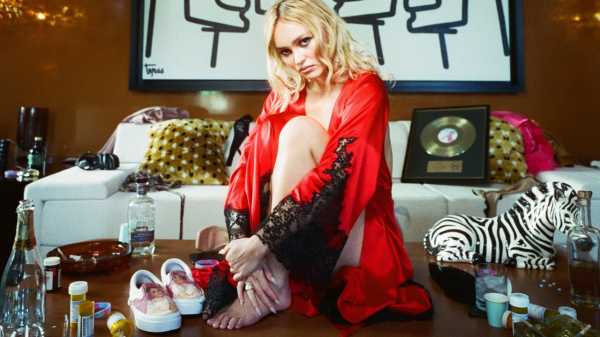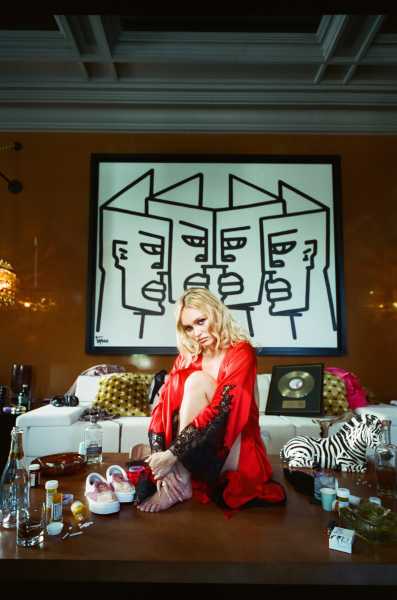
Save this storySave this storySave this storySave this story

Lily-Rose Depp as Jocelyn.Photograph by Eddy Chen / Courtesy HBO
Minutes into the first episode of “The Idol,” on HBO, the series offers a rejoinder to the controversy surrounding its supposed degradation of its young female protagonist. Lily-Rose Depp, who plays a fallen pop star, Jocelyn, is cycling through emotions on cue for an album-cover shoot—her first since suffering a psychotic break the year prior. Crew members flit in and out of the frame, adjusting Jocelyn’s hair and makeup; the rest of her team look on, debating the implications of the hospital bracelet around her wrist. “Are we romanticizing mental illness?” her creative director, Xander (Troye Sivan), asks. “Absolutely,” a label exec, Nikki (Jane Adams), replies, cheerfully brisk. “Will you let people enjoy sex, drugs, and hot girls?”
Jocelyn herself is determined to show off her figure; when an officious intimacy coördinator attempts to enforce the nudity rider in her contract, he’s locked in a bathroom for his troubles. “It’s my body,” she says, insisting that she’s comfortable posing nipples-out. “I don’t feel pressured.”
Her assertions echo Depp’s own after the series premièred at the Cannes Film Festival, where the actress made a case for Jocelyn’s near-constant nudity. “The occasional bareness of the character physically mirrors the bareness that we get to see emotionally,” Depp explained. “I’ve never felt more involved in those kinds of conversations.”
She defended “The Idol” ’s showrunner, Sam Levinson, in the face of questions about Rolling Stone’s reporting on the chaotic production process, which apparently involved a shift away from “the female perspective” at the behest of its co-creator, Abel Tesfaye, a.k.a. the Weeknd; the rewritten scripts were decried as “torture porn.”
Levinson—best known as the creator of “Euphoria,” which has also come under fire for objectifying its female leads—was more philosophical, and more oblique, in response to the critiques. “We know we are making a show that’s provocative,” he said, sitting between a smiling Depp and Tesfaye at a press conference. Levinson didn’t agree with how he was characterized in the Rolling Stone piece, in which a crew member described his version of “The Idol” as a “rape fantasy,” but he also claimed not to mind. “There’s two jobs in this business: there’s the work, and then there’s the managing of a persona,” he said. “Managing a persona is not interesting to me, because it takes away the time and energy that I would spend on the work.”
This duality is at the heart of “The Idol,” a six-episode series that splits its time between the apparatus around Jocelyn—the fleet of managers, publicists, assistants, executives, and lawyers tasked with making her palatable to the masses again, after the mental-health crisis that derailed her career—and the star’s private struggle to produce art that she can stand behind. The former plotline is a dark comedy about the celebrity-industrial complex; the latter is a melodrama that mostly involves Jocelyn smoking tremulously and making eyes at a club manager, Tedros (Tesfaye), with whom she begins an unfortunate affair. As the season goes on (the second episode, which I screened at Cannes, will air on Sunday evening), Jocelyn’s sound shifts under his influence, and it emerges that Tedros, who considers pop music “the ultimate Trojan horse,” has collected a number of gifted acolytes. If the purpose of the group remains obscure, their devotion to their leader is beyond dispute. “He’s godly,” one follower says in Episode 2, shortly after Tedros compels him to sing with a shock collar.
At the end of the pilot, Tedros “helps” Jocelyn find her voice in similarly sadomasochistic fashion, covering her face with her silk robe, lightly tightening the belt around her neck, and using a pocketknife to cut out a mouth hole before incorporating their breath-play into a more risqué version of her new single. The remix is as cringey as the sex scene that engendered it.
The seeds of “The Idol” were reportedly planted when Tesfaye told Levinson, “If I wanted to start a cult, I could”—but his powers of seduction are the least convincing thing about the series, not helped by such anatomically confused lines as “I want to grab you by the ass and suffocate you with my cock.”
Even the characters in Tedros’s thrall suffer from a kind of cognitive dissonance, admitting more than once that their attraction to him is inexplicable. (“I’ve never fucked anyone with a rattail before,” Jocelyn tells him, mid make-out, after the two grind on the dance floor to Madonna’s “Like a Prayer.”) The camera’s leering interest in Depp compounds this imbalance: she strips down repeatedly, but he remains fully clothed. It’s unclear why Jocelyn would ever fall for him, or why characters played by stars with markedly greater stage presence, like the singer-songwriter Moses Sumney and the rapper Jennie Kim, from the Korean girl group Blackpink, would be pulled into his orbit. It might have made more sense to cast Tesfaye as another musician, but denying him his greatest asset was a deliberate choice. As Levinson said at Cannes, “What if this character had all of the dreams that Abel has, all of the vision that he has about culture. . . . but what if he had none of the talent?”
Tesfaye’s lack of charisma is only made starker by strong performances from the likes of Rachel Sennott as Leia, Jocelyn’s confidant and assistant (one of the first to see through Tedros’s act, saying, “I hate his vibe—he’s so rapey”), and Adams as the battle-hardened Nikki, who has no compunctions about treating Jocelyn as an expendable commodity. The show is at its best when the team trade barbed remarks and comeback strategies, which include positioning Jocelyn within a lineage of female artists who have been brutalized by the press. (Fiona Apple plays in the background during a photo shoot; Britney Spears is invoked by name.) As they tiptoe around their still fragile star, the question of which experiences can be made empowering—or at the very least marketable—looms large. When a selfie of Jocelyn, her face slicked with cum, becomes the No. 1 trending topic on Twitter, Nikki declares, “Tomorrow, I want to wake up to, like, a hundred and fifty Google alerts telling me Jocelyn’s some kind of feminist hero.” Jocelyn’s publicist (Dan Levy), who has just reluctantly agreed to treat the image as revenge porn, looks harried. “Yeah, me, too—but I’m gonna start with ‘victim’ and move up from there.”
So far, “The Idol” ’s view of Jocelyn has yet to progress beyond the “victim” phase. For all her talk of wanting to create something real, we have no sense of her artistry or ambitions outside of a focus-grouped single and some pointedly Britney-esque choreography, which is performed flawlessly by Kim—whose character, Dyanne, is one of Jocelyn’s backup dancers—while Jocelyn appears to struggle with it. (“God, I wish I could dance like you,” Jocelyn tells her.) The emphasis throughout is on the starlet’s body and her self-destructive streak, evidenced by a taste for slim cigarettes and erotic asphyxiation; her kinky hookups with Tedros are wince-inducing but hardly scandalizing in the way that the show intends them to be.
Even so, a stylishly shot, faintly sordid project can prove compulsive for some. Though Levinson disputed the details of the Rolling Stone story, his ultimate response was of the all-press-is-good-press variety: it seemed he’d achieved the provocation he wanted, if not in the manner he might have expected. As he recalled at Cannes, “When my wife read me the article, I looked at her, and I just said, ‘I think we’re about to have the biggest show of the summer.’ ” For better or for worse, he may be right. ♦
Sourse: newyorker.com
